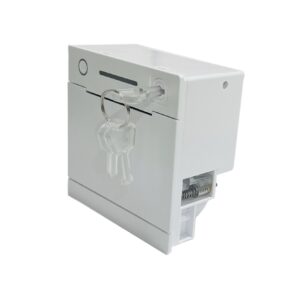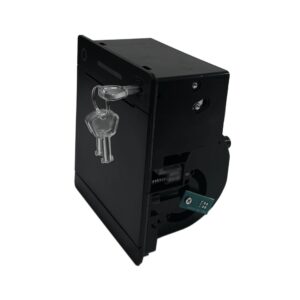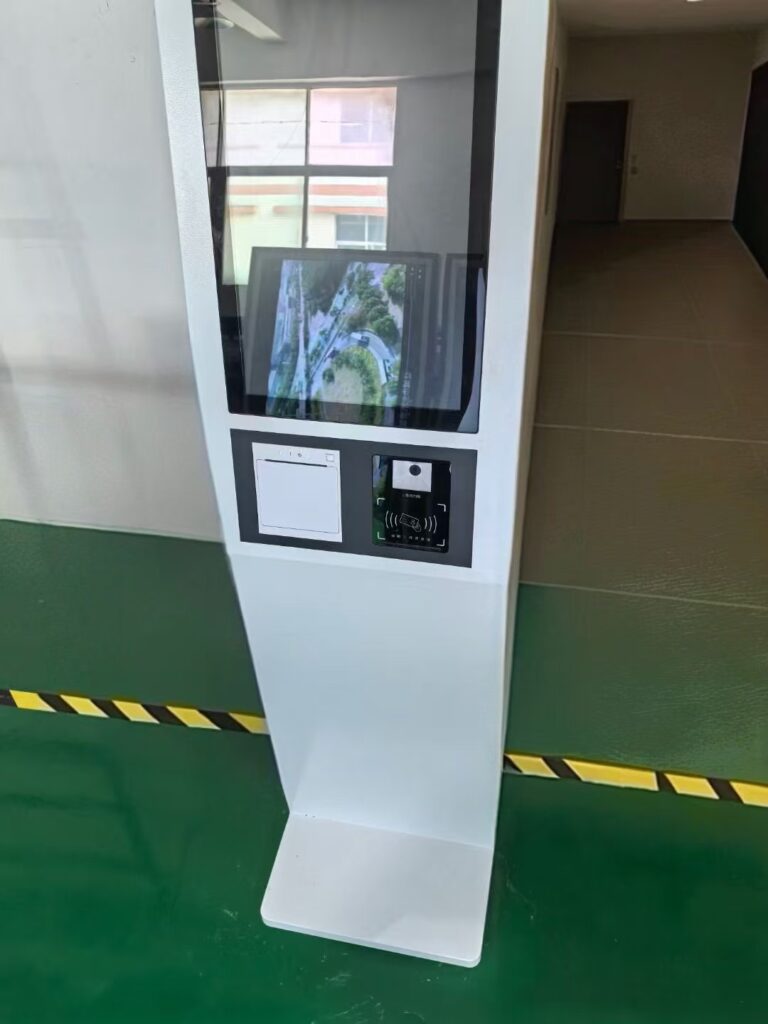The Dominance of Thermal Printers in POS Terminals: A Comprehensive Guide
Introduction
The Heartbeat of Transactions
In the bustling world of retail, hospitality, and beyond, Point of Sale (POS) terminals serve as the backbone of transaction processing. These systems do more than just process payments—they generate receipts, invoices, and order tickets that keep operations flowing seamlessly. At the center of this efficiency is the printer, a critical yet often overlooked component that can significantly impact the customer experience.
Among the various printer types available, thermal printers have emerged as the overwhelming favorite for POS terminals. But what drives their widespread adoption? Why do businesses, from quaint cafes to sprawling retail chains, rely on them? This guide dives deep into the reasons behind thermal printers’ dominance, explores their standout features, and offers practical insights for choosing the right one for your business.
Why Thermal Printers Stand Out
Thermal printers have revolutionized POS environments with their speed, reliability, and cost-effectiveness. As we’ll uncover, they outperform alternatives in ways that matter most to businesses and customers alike. Whether you’re upgrading your current system or building a new one, understanding the role of thermal printers is key to making informed decisions.
Xiamen Eden Printer Co., Ltd., a leader in printing solutions, has harnessed this technology to create products like the PM-581, PM-801, and PM-805 panel printers. Designed for self-service terminals and POS setups, these printers exemplify the qualities that make thermal technology indispensable.
What to Expect in This Guide
Join us as we explore the essentials of POS printing, from the basics of terminals to emerging industry trends. We’ll compare thermal printers to other types, share success stories, and answer common questions—all while showcasing how our solutions at edenprinter.com can elevate your operations. For more insights, check out our blog on thermal receipt printers in 2024.
What Are POS Terminals and Why Printers Matter
Defining POS Terminals
Point of Sale (POS) terminals are where transactions come to life. Whether it’s the checkout counter in a store or a mobile device in a food truck, these systems integrate hardware and software to process sales, track inventory, and manage customer data. They’re the nerve center of modern commerce, ensuring businesses run efficiently.
But a POS terminal is only as good as its components, and printers play a pivotal role. Without a reliable printer, the system’s ability to communicate critical information—be it to customers or staff—falters.
The Essential Role of Printers
Printers in POS systems serve multiple purposes:
- Receipt Printing: Delivering proof of purchase to customers instantly.
- Order Tickets: Relaying instructions to kitchens or fulfillment teams.
- Invoices and Reports: Supporting accounting and management tasks.
A slow or faulty printer can disrupt this flow, leading to long lines, unhappy customers, and operational headaches. That’s why choosing the right printer is a decision businesses can’t afford to overlook.
What Makes a Great POS Printer?
To excel in POS environments, printers must meet specific demands:
- Speed: Quick output to handle peak transaction times.
- Reliability: Consistent performance with minimal breakdowns.
- Compactness: Fitting into tight spaces like counters or kiosks.
- Integration: Working seamlessly with diverse POS setups.
Thermal printers, like those in our panel printer category, meet these needs head-on. For a deeper dive into their applications, see our guide on 10 essential applications of thermal printers.
“In today’s fast-paced retail landscape, the printer is the unsung hero of the POS system. Thermal technology has become the gold standard because it delivers where it counts—speed and uptime,” says Jane Doe, a retail technology expert with over 15 years in the industry.
The Dominance of Thermal Printers in POS Systems
Market Leadership
Thermal printers aren’t just popular—they dominate the POS market. Industry data projects they’ll hold a 75% market share in 2025, far outpacing other printer types. This isn’t a fluke; it’s a testament to their ability to meet the unique challenges of POS environments.
From bustling supermarkets to self-service kiosks, thermal printers are everywhere. Their widespread use reflects a clear preference among businesses prioritizing efficiency and customer satisfaction.
Why Thermal Printers Win
So, what gives thermal printers the edge? Here’s a breakdown:
- Blazing Speed: Printing up to 300 mm/second, they keep transactions swift.
- Low Maintenance: No ink or ribbons mean fewer interruptions.
- Space-Saving: Compact designs fit anywhere, from counters to kiosks.
- Silent Operation: No noisy clatter, enhancing the customer experience.
- Eco-Friendly: Lower power use aligns with green initiatives.
These advantages make thermal printers the top choice for most POS applications. Curious about their mechanics? Our comprehensive guide to thermal printing has you covered.
Xiamen Eden Printer’s Contribution
At Xiamen Eden Printer Co., Ltd., we’ve built our reputation on delivering thermal printers that excel in POS settings. Our PM-581, PM-801, and PM-805 are engineered for reliability and seamless integration, making them ideal for self-service terminals and beyond.



Key Features of Thermal Printers for POS Environments
Space-Saving Design
POS setups often have limited real estate, demanding printers that don’t hog space. Thermal printers shine here with their sleek, compact builds. Our panel printers, like the PM-581, are designed to embed into tight spaces, delivering top performance without cluttering your counter.
Lightning-Fast Printing
Speed is non-negotiable in high-traffic settings. Thermal printers, capable of rates over 200 mm/second, ensure customers aren’t left waiting. The PM-801 exemplifies this, slashing checkout times and boosting efficiency.
Seamless Integration
Modern POS systems vary widely, requiring printers that play nice with different configurations. Thermal printers offer USB, Ethernet, and wireless options like Bluetooth and Wi-Fi. The PM-805 supports multiple interfaces, simplifying setup across diverse systems.
For tips on pairing printers with your setup, see our guide to Bluetooth thermal printers.
Cost-Effective Reliability
No ink or toner means lower running costs and less upkeep. With fewer moving parts, thermal printers also last longer. This durability is why businesses worldwide trust our PM-series for uninterrupted service.
Comparing Thermal Printers to Alternatives
Thermal vs. Dot Matrix
While thermal printers are the go-to for most POS systems, dot matrix printers still have their niche. Dot matrix printers use impact technology to create images, making them slower and noisier than thermal options. However, they excel in environments requiring multi-copy receipts, like restaurants or banks, where duplicates are essential. With a market share of around 15% in 2025, they’re less common but still relevant for specific use cases.
That said, thermal printers’ speed and quiet operation make them far superior for standard POS needs. Our POS printers are designed to meet these demands, offering reliability without the noise.
Thermal vs. Inkjet
Inkjet printers, known for their color capabilities, are rarely used in POS terminals due to their slower speeds and higher maintenance. They require frequent ink cartridge replacements, which can disrupt operations. While they hold about 8% of the market, their use is typically limited to businesses needing color receipts for promotions or branding. For most POS applications, thermal printers’ efficiency and lower upkeep make them the better choice.
Explore more about printer types in our thermal vs. inkjet comparison.
Thermal vs. Laser
Laser printers offer high-quality output and speed but are impractical for POS due to their size and cost. With only a 2% market share, they’re better suited for office environments than compact POS setups. Thermal printers’ smaller footprint and lower operational costs make them the clear winner for most businesses.
Here’s a quick comparison table for clarity:
| Printer Type | Market Share (2025) | Key Strength | POS Suitability |
|---|---|---|---|
| Thermal | 75% | Speed, low maintenance | High (receipts, kiosks) |
| Dot Matrix | 15% | Multi-copy durability | Moderate (specific uses) |
| Inkjet | 8% | Color printing | Low (maintenance-heavy) |
| Laser | 2% | High-quality bulk printing | Low (size, cost) |
Thermal printers’ dominance is clear, but understanding alternatives helps businesses make informed choices. For a deeper dive, check out our guide to barcode label printers.
How to Choose the Right POS Printer for Your Business
Assess Your Business Needs
Selecting the right POS printer starts with understanding your business’s unique demands. Consider factors like transaction volume, space constraints, and specific printing needs (e.g., receipts vs. labels). High-traffic environments, such as busy retail stores, require printers with exceptional speed and durability, like our PM-801.
Compare Printer Types
While thermal printers are ideal for most POS systems, other types may suit niche applications. For instance, if your business requires multi-part forms, a dot matrix printer might be necessary. However, for standard receipt printing, thermal printers offer unmatched efficiency. Our printer mechanisms provide flexible options for various setups.
Budget Considerations
Thermal printers often have a higher upfront cost but lower long-term expenses due to minimal maintenance and no ink requirements. This makes them cost-effective over time. When budgeting, factor in both initial investment and ongoing operational costs. Xiamen Eden Printer Co., Ltd. offers competitive pricing and reliable support, ensuring value for your investment.
Integration and Support
Ensure the printer you choose integrates seamlessly with your existing POS system. Look for compatibility with your software and connectivity options like USB, Ethernet, or wireless. Our PM-805 supports multiple interfaces, making it versatile for different environments. Additionally, choose a manufacturer known for excellent after-sales service, like Xiamen Eden Printer Co., Ltd., to keep your operations running smoothly.
Emerging Trends in POS Printing Technology
Mobile POS Printers
The rise of mobile POS systems has spurred demand for portable printers. Projected to reach USD 4.2 billion by 2032, mobile POS printers are often thermal-based for their compactness and reliability. These printers are perfect for on-the-go transactions, such as in food trucks or pop-up shops. Our mobile printers cater to this growing trend, offering flexibility without sacrificing performance.
Wireless and Cloud-Based Printing
Wireless connectivity, including Bluetooth and Wi-Fi, is becoming standard in POS printers. This allows for greater flexibility in setup and supports mobile devices seamlessly. Cloud-based printing enables remote management and real-time updates, enhancing operational efficiency. Our Bluetooth thermal portable receipt printer exemplifies this trend, providing businesses with cutting-edge connectivity options.
Sustainability and Eco-Friendly Options
Environmental concerns are driving demand for eco-friendly printing solutions. Thermal printers are inherently more sustainable due to their lower power consumption and the availability of BPA-free thermal paper. Businesses looking to reduce their carbon footprint can benefit from these green innovations. At Xiamen Eden Printer, we prioritize sustainability in our product designs, aligning with global eco-friendly trends.
Real-World Success with Thermal Printers
Retail Efficiency Boost
A leading retail chain implemented our PM-801 thermal printers across their stores. The result? A 20% reduction in checkout times, leading to shorter lines and happier customers. The printers’ speed and reliability were key to this success, demonstrating the tangible benefits of choosing the right technology.
Self-Service Kiosk Uptime
In a busy transit hub, self-service kiosks equipped with our PM-581 panel printers saw a significant improvement in uptime and customer satisfaction. The printers’ compact design and low maintenance needs ensured smooth operations, even in high-traffic areas. This case highlights how thermal printers can enhance self-service solutions.
For more insights into kiosk printing, visit our ultimate guide to kiosk printing.
Answers to Common POS Printer Questions
What’s the Difference Between Thermal and Dot Matrix Printers?
Thermal printers use heat to create images on thermal paper, offering fast, quiet operation ideal for receipts. Dot matrix printers, on the other hand, use impact technology, making them slower but capable of printing multi-copy forms. For most POS applications, thermal printers are preferred for their efficiency.
How Do I Maintain a POS Printer?
Regular maintenance is key to longevity. Clean the printer head periodically, use high-quality thermal paper, and follow the manufacturer’s guidelines for care. Our panel printers are designed for minimal upkeep, but routine checks ensure optimal performance.
What’s the Lifespan of a POS Printer?
With proper care, POS printers can last 3-5 years or more. Thermal printers, like our PM-series, often outlast other types due to fewer moving parts. Regular maintenance and quality components contribute to extended lifespan.
How Does a POS Printer Connect to the System?
POS printers connect via USB, Ethernet, or wirelessly (Bluetooth, Wi-Fi). Wireless options offer greater flexibility, especially in mobile setups. Our Bluetooth printer supports multiple platforms, making integration a breeze.
Conclusion
Thermal printers have rightfully earned their place as the top choice for POS terminals, thanks to their speed, reliability, and cost-effectiveness. As businesses strive for efficiency and customer satisfaction, investing in the right printer is more critical than ever. Xiamen Eden Printer Co., Ltd. stands at the forefront of this technology, offering solutions like the PM-581, PM-801, and PM-805 that are tailored for seamless integration into self-service terminals and POS systems.
Ready to elevate your business operations? Explore our full range of panel printers and discover how we can help you achieve your goals. Visit edenprinter.com today to learn more and take the next step toward a more efficient future.
External Links
- POS Receipt Printers Market Share, Trend & Forecast 2033 | FMI
- Point of Sale (PoS) Receipt Printer Market Size, Share, Forecast 2025 | TMR
- POS Printers Market Size, Share – Industry Report 2031 | BRI
- Point of Sale (POS) Receipt Printer Market Size by 2030 | CMI
- Point of Sale (PoS) Receipt Printer Market – Global Industry Analysis and Forecast (2024-2030) | MMR
- What is the meaning of POS Printer? | Ryans Computers
- 8 Tips on How to Select the Right POS Printers or Receipt Printers? | TVS-E.in
- What are the Main Types of POS Printers? | Xprintertech.com
- Receipt Printers for POS: How to Choose a Receipt Printer | PointofSale.com
- What Is a Point of Sale System And How Does It Work? | Square
- What Is a POS System and How Does It Work? | NerdWallet
- What Is a Point of Sale (POS) System? | Softwareadvice.com


